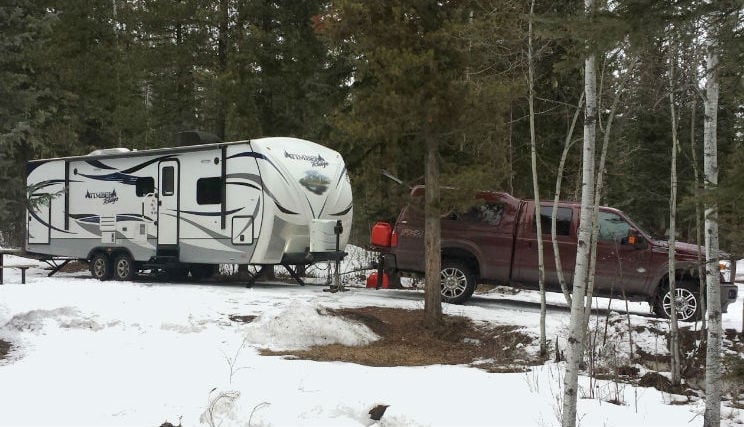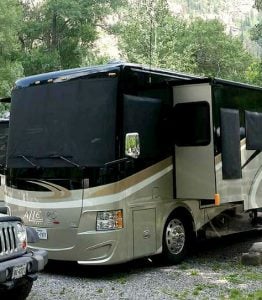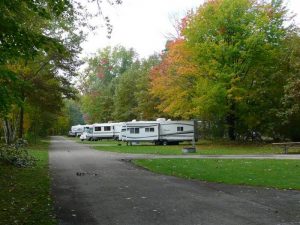As RVers we have the option to leave a spot when we don’t like the weather. But if you’ve ever been caught in a sudden cold spell or baked in an unexpected heatwave while camping, you know that relocating isn’t always easy.
The best way to stay comfortable during cold weather or keep cool during hot conditions is by remembering how to park your RV in these conditions at your next destination.

In winter, point your rig so that oncoming winds will hit the RV’s front or back ends. Photo courtesy of Jtbuilds, iRV2.com
You can’t prevent wind, rain, snow, or heat. But you can stay comfortable in a season of extremes by taking simple preventive measures before settling into your campsite.

Make an effort to park your RV so the windows are away from afternoon sun. Photo courtesy of Lt Dan, iRV2.com
First, observe how your RV is parked
Sometimes you just want to roll into a spot and call it a day. But preparing for any kind of weather means doing a quick parking assessment before shutting off your engine. When you arrive at your campsite, notice the direction in which your RV is pointing.
- To stay warm in winter, choose a campsite that makes the most of afternoon sunshine. Point your rig in such a way that your biggest windows face southwest.
- To keep cool in summer, point your RV’s windows and exterior refrigerator vent away from afternoon sun.
Next, watch how sunlight hits exterior refrigerator panels
RV refrigerators work harder whether external temperatures are rising or dipping below freezing. You can verify if yours is at an optimal temperature inside by keeping a simple thermometer in the appliance. If you notice your refrigerator’s internal temperature is rising, it won’t chill food as effectively. A hard-working refrigerator will also radiate more heat into your RV. Try this to help your refrigerator run efficiently:
- In warm weather, keep direct sunlight off the external refrigerator panels.
- In freezing weather, do the opposite. Try to keep the external vents warmed with direct sunlight.
Finally, avoid wind as much as possible
Summer breezes offer a respite when you’re inside a rig. But winter winds can create bone-chilling temperatures inside the living area.

Always try to park near any trees or shrubs as they can act as wind breaks. Photo courtesy iRV2.com
Never park until you have a good sense of wind direction. A quick scan of the current weather report should give you enough information to know the best parking orientation, which is:
- In winter, point your rig so that oncoming winds will hit the RV’s front or back ends. You don’t want wind to hit the sides, especially not the slide outs. Also, try to park near any trees or shrubs can act as wind breaks.
- During summer, those wind breaks can offer shade. But what’s more important is parking your RV so cross-breezes go right through your living area.
Staying comfortable in different seasons requires you to strike a balance between multiple on-board needs.
Appliances, solar power generation and temperatures inside your living space are big factors to consider when you park your RV in cold or hot weather.
Some needs might have to be sacrificed for others. Don’t decide to stay put anywhere until you consider the pros and cons of the direction in which your rig is pointed.

These are great idea’s if your boondocking, but when in an RV park you have to park the way your slot is.
You are correct Kim, any organized camp site is just that, organized. This article is most helpful if you are dry camping in a field that doesnt have restrictions. You can ask for a specific slot of course but you dont have any control over it.
Kimberly is right, you don’t have a choice, even in pull throughs.
Also I don’t use Facebook and etc.
Good information for parking along the road somewhere or in the desert but not for the normal rv park.
Knowing where the wind is coming from may be a good idea, but in many areas, like here in South Florida, wind may change direction many times throughout the day, especially in winter.